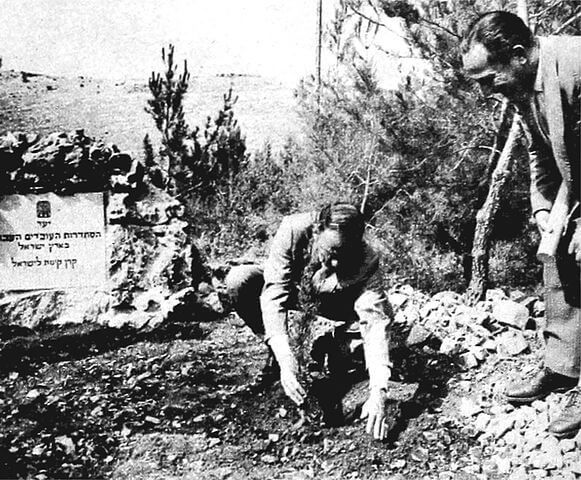The idea to boycott Israel began to receive a lot of attention in the 21st century due to the creation of the BDS movement in 2005. But boycotting as a method to cause damage and attempt to destroy Israel actually began in the early part of the 20th century with the Arab boycott.
Related reading: BDS: Myths and Facts
As early as 1922, the Arab community in British controlled Palestine sought to hurt the growing Jewish community in the region via economic boycott of Jewish-owned businesses in the land. Those who violated the boycott were attacked – both physically and with damages to the goods that they sold. The Arab Executive Committee of the Syrian-Palestinian Congress implemented a boycott of Jewish businesses in 1933, and the Arab Labor Federation did the same in 1934.
Join the fight for Israel’s fair coverage in the news
The Palestinian Arab leadership called for a strict boycott in 1936 and outright threatened violence against anyone who violated the boycott. These boycotts sought not only to hurt the Jews already living in Palestine but to also scare diaspora Jews from continuing to move to the region. These boycotts were unsuccessful because Palestinian society was already very reliant on Jewish doctors and professionals in other fields.
The Arab League formed in the mid-1940s and on December 2, 1945 it prohibited buying or using any products made by Jewish companies in Palestine and prohibiting Arabs from using Jewish contractors, transportation services, insurance companies and banks. They established a Permanent Boycott Committee with offices in all Arab states and required anyone selling anything to an Arab state to demonstrate that they did not originate from Jews in Palestine.
This boycott was also unsuccessful, and the Boycott Committee’s first annual report indicated continued robust trade between Palestine, where most companies were owned by Jews, and the neighboring Arab states. The committee ceased to exist following Israel’s declaration of its independence in May 1948, but the Arab League continued its calls for a boycott of Jewish companies in Israel. Arab states imposed a land, sea, and air blockade on the newly founded state, confiscating Israeli goods shipped through Port Suez, Port Said, and Alexandria – creating a significant challenge for Israeli exports.
King Farouk of Egypt issued an order on February 6, 1950 prohibiting the passage of any goods to Israel through the Straits of Tiran and the Gulf of Aqaba. Aside from causing damage to Israel, which at the time was getting 90% of its oil from Iran shipped through these channels, it expanded the boycott to stop Israel from doing business with other countries. The Arab League approved this expanded boycott on April 8, 1950. The United Nations Security Council condemned the boycott but did not implement any measures to stop it.
On May 19, 1951 the Arab League created the Central Boycott Office with offices in all Arab states. The mission was to coordinate and report regarding companies that violated its boycott of Israel. The Arab League passed a resolution on December 11, 1954 prohibiting Arab states and companies from dealing with any people or companies carrying out work for Israel or having branches in Israel. Anyone found exporting Arab goods to a country for re-export to Israel would be penalized with large fines and hard labor.
The boycott against Israel became even stronger in the mid-1950s when the Soviet Union got involved. The Soviet participation in the boycott gave it international legitimacy and economic teeth. Air France was the first major company to fold under the boycott pressure after it was denied overflight and landing rights in Arab countries for 18 months because of its investment in Israeli projects and it ceased its involvement with Israel. That same year the boycott was extended to prohibit anything exported by a country which was in any way identical to goods which that country imported from Israel. In addition, any ships found to have visited an Arab port and an Israeli port in the same trip were blacklisted.
The most challenging boycott period came in October 1973 following the Yom Kippur War when the Arab countries banned the shipment of oil to the United States, Canada, the United Kingdom, the Netherlands, and Japan because of their support for Israel. They threatened to cut oil production by 5% per month “until the Israeli forces are completely evacuated from all the Arab territories occupied in the June 1967 war.” The embargo lasted for just five months.
While some major companies such as McDonald’s, Pepsi, Nestle and Toyota participated in the boycott, many major companies chose to openly do business with Israel and lose the Arab market. These included: Coca-Cola, Ford Motor Company, Revlon, RCA, Barclays Bank, Bantam Books, Zenith, McDonnell Douglas, Sears Roebuck, General Electric, Hilton, Avis, Citibank, Hewlett Packard, Mercedes-Benz, Colgate, and IBM.
Through the 20th century, the Arab world also boycotted entertainers who performed or supported Israel. This did not deter a long list of entertainers from engaging with Israel. They included: Elizabeth Taylor, Louis Armstrong, Frank Sinatra, Harry Belafonte, Marilyn Monroe, Jerry Lewis, Kirk Douglas, Mick Jagger, Paul McCartney, Elton John, Paul Simon, and Raquel Welch.

As the Arab boycott policy continued, companies worldwide, desperate to do business with Israel and benefit from the products being invented and manufactured there while not wanting to forego the Arab market, found ways to circumvent the boycott. Some disguised their connection to company divisions and had those affiliates work with Israel. Others simply subcontracted with companies already blacklisted by the Arabs for working with Israel. There were some companies that simply developed such good relationships with the Arab leaders that they ignored the work that they were doing with Israel.
Israel went on the offensive and encouraged Jewish business owners worldwide not to do business with companies participating in the boycott of Israel. On the diplomatic front, Israel worked with the United States to pass a law making it a crime for American companies to adhere to the boycott with fines imposed on companies participating in boycotts. Some companies such as McDonald’s preferred the economic benefit of business with the Arab world, so they paid the fines and continued supporting the boycott.
Israel also found ways to do business with the Arab world despite the boycott. In some instances, non-Israeli companies purchased Israeli materials or technology and used them to manufacture their products. They then exported them to Arab countries with no hint as to where they originated. Some Israeli companies simply set up fake companies in other countries. They imported the goods from Israel and exported them to Arab countries using the labels of the fake company. American companies did the same – importing Israeli goods and then exporting them as “Made in the USA.”
Israel’s efforts to circumvent the boycott were extremely successful. By the late 1980s it was estimated that 10% of Israel’s annual exports, between $750 million and $1 billion worth of trade, was reaching Arab countries.
Despite these attempts to destroy Israel’s economy, Israel has built one of the strongest economies in the Middle East. In addition, many of the Arab states no longer adhere to the boycott due to agreements they signed with Israel – Egypt in 1979, the Palestinian Authority in 1993, Jordan in 1994, and the Gulf States in 1994 when the Cooperation Council for the Arab States in the Gulf (Gulf Cooperation Council) ended their participation in the boycott. This led to a massive upswing in investment in Israel and led to numerous instances of cooperation between Israel and Arab countries.

The history of the Arab boycott movement against Israel proves that boycott attempts are useless. Those who support Israel continue doing so despite the boycotts, and even among those who may have disagreements with Israel, most countries, companies, and individuals prefer not to deny themselves the economic and technological benefits which they gain from a relationship with Israel.
The BDS movement should take note.
Enjoyed reading this article? Follow the Israel In Focus page on Facebook to read more articles explaining Israel’s history, politics, and international affairs. Click here to learn more!

